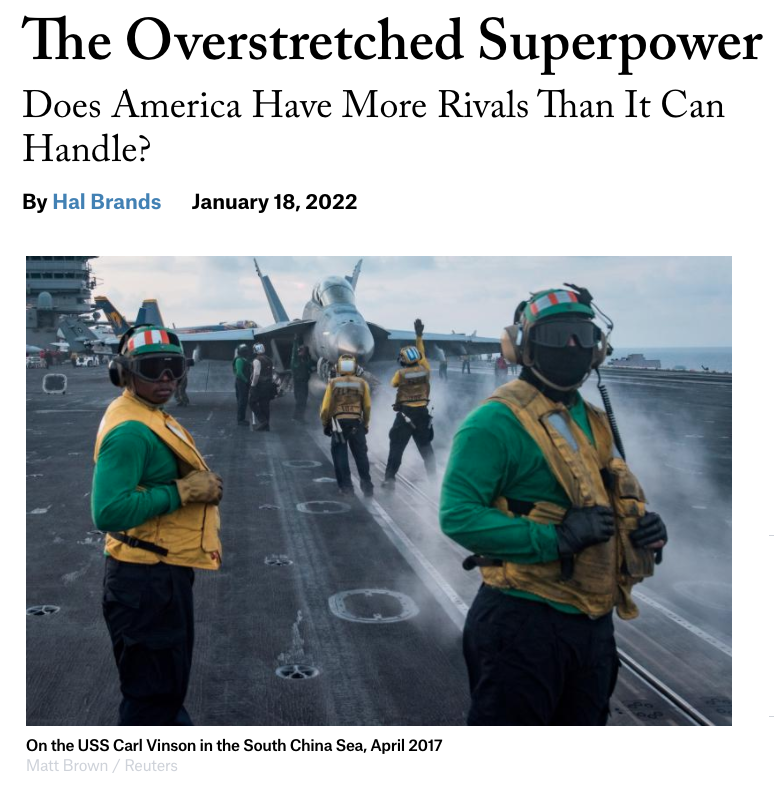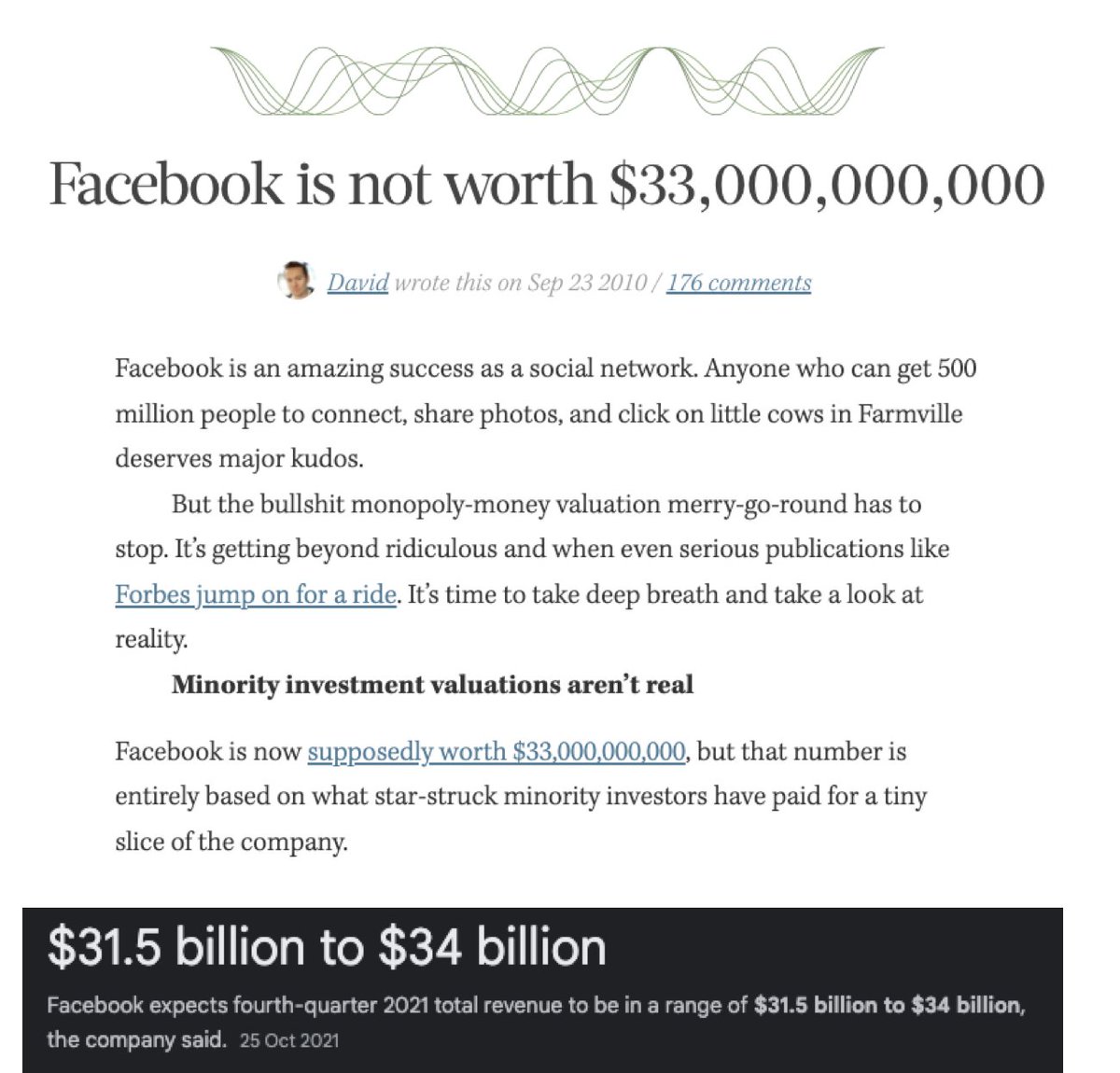
Russian troops have been massing near the Ukrainian border for weeks. Negotiations not looking good. US carriers also apparently now positioned to deter China if something happens in Ukraine.
No idea what's going to happen or which reports are accurate. Monitoring with caution.


No idea what's going to happen or which reports are accurate. Monitoring with caution.



Some thoughts:
1) Fog of war applies. Who knows what reports are real? Military deception is a thing.
2) This is one of those things (possible simultaneous conflicts with Russia and China?) that you'd think would get more attention. Not that attention necessarily helps...
1) Fog of war applies. Who knows what reports are real? Military deception is a thing.
2) This is one of those things (possible simultaneous conflicts with Russia and China?) that you'd think would get more attention. Not that attention necessarily helps...
Also, if you're truly taking Gell-Mann amnesia into account, every article has to be put through the filter that media corporations are unreliable narrators.
But *if* they didn't butcher this quote, then Russia is saying negotiations are at a "dead end".
bloomberg.com/news/articles/…
But *if* they didn't butcher this quote, then Russia is saying negotiations are at a "dead end".
bloomberg.com/news/articles/…
Again, I have no idea what'll happen here.
But a still underappreciated development is how good open source intel (OSINT) from public data is getting relative to what the state has.
So, you may be able to figure out what's real from satellite imagery.
rferl.org/a/russia-build…
But a still underappreciated development is how good open source intel (OSINT) from public data is getting relative to what the state has.
So, you may be able to figure out what's real from satellite imagery.
rferl.org/a/russia-build…

Here's the thread on the navy buildup in the Pacific, apparently to deter China.
Again, I don't know if the statement below is accurate (would need a graph over time to see this) but seems significant if true...

Again, I don't know if the statement below is accurate (would need a graph over time to see this) but seems significant if true...
https://twitter.com/GavinSBaker/status/1484247489918164998

Multipolarity is uncertainty.
In a unipolar world no one even thinks of trying anything. They know they can't win, they know the hyperpower will fight if they try, and they know the hyperpower will win if it fights.
Now all those certainties have become probabilities.
In a unipolar world no one even thinks of trying anything. They know they can't win, they know the hyperpower will fight if they try, and they know the hyperpower will win if it fights.
Now all those certainties have become probabilities.
So long as Russia & China felt they couldn't win, they didn't try.
Now they think maybe the US won't fight, or maybe the US won't win if it does fight.
They went from 100% loss to nonzero chance of win.
That nonzero chance *itself* incentivizes aggressive people to try things.
Now they think maybe the US won't fight, or maybe the US won't win if it does fight.
They went from 100% loss to nonzero chance of win.
That nonzero chance *itself* incentivizes aggressive people to try things.

This reflects many of the same themes we've been talking about. Other factors include the inflation, the civil unrest, the crime, the supply chain issues, and the rise of the rest of the world.
defenseone.com/ideas/2022/01/…
defenseone.com/ideas/2022/01/…

When you lose your grip on one thing, something else starts to escape the grip, and then another, and another.
And then maybe it all escapes control very fast, first abroad and then at home.
And then maybe it all escapes control very fast, first abroad and then at home.
https://twitter.com/balajis/status/1450611265722728451
"Washington has more responsibilities…than it has coercive means."
Capturing the state only yields the power to coerce when (a) the state is competent and (b) the targets of coercion are relatively weak, not very numerous, or both.
No longer the case.
archive.is/bgkHz
Capturing the state only yields the power to coerce when (a) the state is competent and (b) the targets of coercion are relatively weak, not very numerous, or both.
No longer the case.
archive.is/bgkHz

By the way, something I've been thinking about for years is just how skewed our attention is.
From Oct 2016 to July 2017, the insanity below was happening in Mosul. I think many people knew there was a battle with ISIS, but did they know the scope of it?
From Oct 2016 to July 2017, the insanity below was happening in Mosul. I think many people knew there was a battle with ISIS, but did they know the scope of it?
https://twitter.com/HKaaman/status/1484543766878904330
If Twitter's backend was open state, we could quantify just what people were paying attention to & perhaps plot that vs some measure of long-term significance.
Attention itself won't solve problems, of course. But it's curious how little this was covered.
Attention itself won't solve problems, of course. But it's curious how little this was covered.
https://twitter.com/mtracey/status/884182649891299329
By the way, this joint statement from the US, Russia, *and* China (and France, UK) went up on Jan 3.
From one standpoint, you might read this as saying "no guns, let's settle this with fists".
Take nukes off the table for a conventional shooting war...?
whitehouse.gov/briefing-room/…
From one standpoint, you might read this as saying "no guns, let's settle this with fists".
Take nukes off the table for a conventional shooting war...?
whitehouse.gov/briefing-room/…

Linked from this decent overview of (reported) events.
drpippa.substack.com/p/warwords-par…
drpippa.substack.com/p/warwords-par…
• • •
Missing some Tweet in this thread? You can try to
force a refresh













